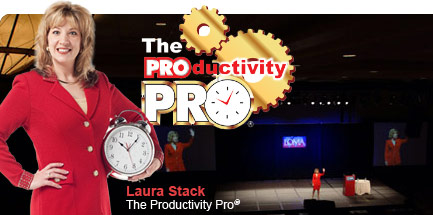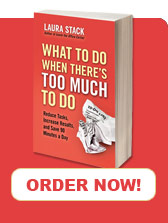Personal Productivity as a Habit
By this point in your career, you've most likely figured out the basic requirements for achieving workplace productivity. No doubt you have a good idea of how to manage your time, set goals, break big tasks into smaller ones, prioritize your task list, keep your email inbox empty, shake off procrastination, and dodge perfectionism. In other words, you've learned the principles of high performance.
But knowing what to do doesn�t matter if you don�t do it: day in and day out, in all circumstances, even when you don't feel like it. Fortunately, human nature serves you well here. Once used to a task, you can generally shift into a semi-automatic mode that allows you to perform the task efficiently, without having to constantly remind yourself about what comes next. Having a routine saves you time, effort, confusion, and (at some level) conscious thought.
For example, think back to when you learned to drive (my first car was a Ford Pinto, yikes!). When you first got behind the wheel, you probably felt anxious and hyper-aware of your environment at all times. You had to think about every little thing you did�turn on your blinker, look in the mirror, park without hitting anything. You essentially followed a "recipe" in order to accomplish your task. But after a while, it became routine. Now you automatically slip your seatbelt on, quickly glance in the mirrors, and make your adjustments before you turn the key�all more or less without thinking. Even after you get on the road, you remain fairly relaxed. You keep an eye on your environment almost subconsciously�while you�re actively thinking about other things�and sometimes doing other things (you know who you are).
This process easily translates to the workplace. Now, I'm not telling you to just turn off your brain while at the office, and I certainly don't mean you should ever stop looking for more efficient ways to do your work. But at the risk of wearing yourself into a rut, habits can help you achieve a consistent level of productivity. Mind you, this falls into the "easier said than done" category, because the overall productivity habit consists of a lot of smaller, self-reinforcing habits that come together to maximize efficiency.
Formulating a Plan
When you get right down to it, most of your actions stem from established habits. Indeed, according to some philosophers, one's behavior represents little more than the sum total of one's personal customs and traditions. I find this attitude simplistic, but I do agree that the engine of routine, properly harnessed, can be very powerful.
The problem is that individual habits can often work against each other. To use an analogy, if you hitch up a wagon with four strong horses pulling in four different directions, you probably won't make much progress toward anything. Ah, but when you get the horses yoked together properly and going in the same direction, off you go at a good pace.
If things seem to go every which way in your work life, or grind along with little direction, then you may be dealing with old ingrained habits working against one another. You can't easily fix this on the fly; any life-changing activity requires careful thought and planning. So arrange some time when you can brainstorm, and sit down with pen, paper, and your most important productivity resources: your brain, experience, and imagination.
Examine your routine, and ask yourself what each of your existing habits does for you. If necessary, document every piece of your typical day from the time you arrive at the office to the minute you leave work. You may discover that some of your habits actually work against productivity. For example, if you regularly arrive late or take a smoke break on the hour every hour, then you can safely say you're shooting yourself in the foot from a productivity standpoint.
Even necessary workplace tasks can hinder productivity if you approach them the wrong way. Email serves as a classic example; keeping your email open all day and checking it repeatedly diverts your attention and destroys focus. Unless your job requires otherwise, a better habit would be to handle your email just a few times a day. In this case, you'll need to erase the old habit and replace it with the new one.
Again, easier said than done. But habit is all about making gradual changes to your behavior, until you break out of the old grooves and develop new ones. As Mark Twain once pointed out, "Habit is habit, and not to be flung out of the window by any man, but coaxed downstairs a step at a time."
Making and Breaking
So as you embark on your voyage of self-improvement, don't get in a hurry. Accept that developing a new routine takes time. Leo Babauta, the author of the influential Zen Habits blog, recommends setting yourself a 30-day challenge for changing each habit.
Furthermore, work on one habit at a time (though you can simultaneously break an old one and replace it with another). As with productivity in general, multitasking is self-defeating here; instead, "single-task" fiercely, focusing on slotting the new habit into place and making it a solid part of your life before moving on to the next thing you want to change. Trying to do it all at once can overwhelm you and lead to massive failure. But if you keep climbing steadily along what Leo calls "the spiral of successful habits," you'll soon find it happening faster and coming more easily.
Choose the first habit you want to modify or establish, and make it your top priority. Treat it like any other task. If necessary, create a plan for setting or breaking the habit and lay it out in writing, with suitable milestones to mark your progress. You may find it easier to form a new habit by making yourself publically accountable for it: i.e., by telling people you intend to change, so their expectations keep you on the straight and narrow. You can also join forces with a buddy trying to change the same habit. Dieters do this all the time, as do people trying to stop smoking. Either way, the support you receive can push you farther toward achieving your productive ends.
List, Frogs, and MITS
You've probably learned the value of a to-do list for maximizing your limited time, so don't hesitate to leverage yours in your quest to mortar your new habit into place. Of course, you can't easily pin down some habits in this manner, but schedule them when you can. For the rest, change your thought patterns. This in itself may require a new habit. While you need not put "Think about my new habit" at the top of your to-do list, it can't hurt to write yourself a little reminder on a sticky note and put it where you'll often see it. After a few days, it'll become second nature, and you won't need the reminder anymore.
For example, my colleague Brian Tracy calls unattractive but unavoidable tasks "frogs" in his book Eat That Frog. He suggests you make a habit of jumping on your frogs and "eating them" first thing in the morning, because that�s the worst thing that can possibly happen. After all, most of us have fewer distractions, greater focus, and more energy earlier in the day. Your sticky note (or electronic reminder) might say something as simple as "Frogs first."
Keeping At It
As you work toward setting a new habit (or ridding yourself of an old one), do your best to avoid falling back into your previous way of doing things. Don't pretend the temptation doesn't exist; know it does, and when you get the urge to act in the old unproductive manner, deliberately do something else until the urge passes. Don't fall prey to rationalizations like, "Just this once won't hurt." In truth, "just this once" can sabotage the entire effort; ask anyone who has tried to quit smoking. Missing one day might not derail you, but missing two could. If you don't persistently exercise the behavior you want to ingrain, then how can it possibly become a habit?
Now, that said, as a mere human you can't possibly achieve perfection all the time (and Heaven forbid you should try). Even though you try hard, you may backslide a bit before you get your new habit on track. If it happens, don't ignore the failure, but don't fret too much about it; just get right back on the horse.
Even if you only perform the habit in a small way on a particular day, try to do it. Five minutes spent formulating and implementing your new habit is better than no time spent at all, even if you meant to spend an hour at it. If you just can't seem to get going on the habit no matter what you do, stop for a while and try to figure out why. You may discover that at some level, you simply dislike the new habit. If this proves the case, investigate the reasons. Do you subconsciously find it distasteful? Does it seem like too much work? Does it simply not fit into your working style?
Once you've pinned that down, decide whether you truly want to pursue the habit. For example, let's say you've decided to start drinking a little more coffee in the morning to sharpen you up and get your brain in gear. If this truly helps and you don't get too jittery, then fine; keep at it. If the drawbacks seem to outweigh the productive benefits, then you may want to rethink whether you should develop the habit at all.
If the habit does seem worthwhile, then determine which obstacles you need to overcome in order to get from here to there, and start eliminating those obstacles. Get serious about incorporating the habit into your routine. Needless to say, you'll find it much easier to do so if you actually enjoy the task. This can prove superbly difficult if the task is annoying, unpleasant, or simply unrewarding. But if you can profit from the habit, then do your best to learn to enjoy it�or at least some facet of it. You've heard the term "fake it until you make it." This really can work if you try hard enough, especially if you sweeten the pot with some sort of reward for putting your head down, focusing, and pushing on through. If you can subconsciously associate the difficult task with something enjoyable, you'll have less of a problem making it a habit.
The Bottom Line
When properly applied, consistency is incredibly productive. Once you establish a good set of workplace productivity habits and practice them so often they become more or less automatic, you can conquer the world. Take care here: don't switch your brain off as you work through your cycle of routine, because that can lead to unproductive ruts and "good-enough" behavior. But do take advantage of this powerful aspect of human nature to boost your workplace effectiveness and make productivity a glorious habit.
If you'd like further details on how to construct and maintain an effective workflow process that allows you to get everything done and still have a life outside of work, be sure to grab a copy of my new book, What To Do When There's Too Much To Do, when it hits bookstores in 2012.
Make it a productive day! ™
© Copyright 2012 Laura Stack. All rights reserved. www.TheProductivityPro.com | 


